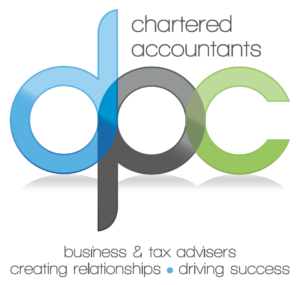DPC Accountants Stoke-on-Trent
DPC Business & Tax Advisers
Creating Relationships – Driving Success
Wherever you are in your business journey, just starting out, established and running a successfully business, looking to retire to grow your business, or just need some help with meeting your tax obligations, DPC Accountants Stoke-on-Trent have all the skills to help you achieve your financial goals and keep you compliant.
Our aim is to build lasting relationships to understand your business and personal financial goals and help you achieve them.
We can provide you a professional, honest, and personal service from day-to-day business accounting and compliance, through to specialist tax or business advice, and auditing.
Our team have a wealth of experience to help individuals, entrepreneurs, and businesses to reach their full potential and grow and develop.
We help a wide range of businesses from corporate groups, owner managed businesses, sole traders and partnerships working across multiple business sectors and industries.
We use and embrace technology to enable us to deliver accurate and efficient information to you which enables us to provide advice that adds value to your business.
Our staff are trained to a high standard and our work is regulated by the ICAEW accountancy body, ensuring we deliver a high standard of service to all our clients.
Working with you to ensure the success of your business relies on strong relationships, trust and integrity.
As a well-known Staffordshire firm of chartered accountants and business advisers, DPC Chartered Accountants Stoke-on-Trent use intelligent accounting solutions and expert advice to guide business and private clients.
Continual staff training and in-house skills are invested in to deliver the most up-to-date services compliant with HMRC, digital technology and data protection.
Whether you run a start-up company, a growing business, are looking to exit a business or require taxation advice, you can be assured of the highest quality guidance and tax solutions.
DPC Chartered Accountants are part of The DPC Group Limited, built on over 80 years’ experience.
The heritage of DPC Group Limited originated with Edwin Downward on February 9, 1943 who set up shop as a sole practitioner in Wellesley Street, Stoke-on-Trent.
Welcoming John Plumb in 1962 and Mike Colclough in 1963, the firm became known as Downward, Plumb and Colclough – later adopting the acronym DPC.
Over the course of its rich history as a firm of accountants in Stoke-on-Trent (80-years celebrated in July 2023) DPC has gone from strength to strength embracing many changes and a commitment to constant innovation.
When computers were a fledgling industry, DPC took a chance by investing into new technology by spending £3,500 on a revolutionary Logabax accounting machine in June 1967.
The investment enabled advanced accounting (at the time) for some of Staffordshire’s most prominent businesses. The efficiency in financial affairs resulted in many of these organisations achieving international success.
Looking to work as an accountant in Stoke-on-Trent? We welcome people at all stages in their careers, from school leavers and recent graduates to experienced professionals.
We’re focused on attracting the best talent, putting people into the right roles and offering the best professional training and personal development to deliver a first class client service.
We offer fully funded and supported professional training at each stage of an accountancy/ audit/ tax career i.e. AAT, ACCA, ACA (ICAEW), ATT, or CTA. This is supplemented with an in-house mentor and Personal Development Plan.
We offer structured career paths across a range of roles within the practice
We are hiring
Accountants in Stoke-on-Trent

Are training costs tax deductible for the self-employed?
HM Revenue & Customs have recently updated and clarified their guidance on training costs paid by the self-employed. The general rule for whether the cost of a training course can be deducted from your self-employed profits is that it must be incurred wholly and exclusively for the purposes of the trade being carried out by the business at the time that the training is undertaken.

What is the future for the National Minimum Wage?
The Low Pay Commission (LPC) has published a report on the future of the National Minimum Wage beyond 2024. In recent years, the LPC has been setting the National Living Wage based on a target of two-thirds of median hourly earnings.

Farmers encouraged to keep everyone safe around livestock
The Health and Safety Executive (HSE) have reminded farmers to stay safe around livestock, not just for themselves and their workers, but also with walkers who may use public footpaths. Their Your Farm, Your Future campaign is aimed at improving safety on farms, and there is a focus on livestock in 2024.

Food inflation slowing down according to BRC
The British Retail Consortium (BRC) has released figures showing that food price inflation in March has slowed to its lowest level since December 2021. Shop Price annual inflation dropped to 1.3% in March, compared with 2.2% in February.

UK artists to benefit from new UK-Australia Free Trade Agreement
As a result of a new UK-Australia Free Trade Agreement (FTA), UK artists will now be able to claim resale royalties when their art is resold in the Australian professional art market. Previously, UK artists have not received any royalties when their artwork was resold in Australia.

Good bookkeeping: A backbone of business success
Keeping your accounting records up to date can feel like a chore, but when your bookkeeping is kept up to date, you and your business can gain some significant benefits, including financial clarity, budgeting and planning, compliance and tax management, monitoring cash flow and identifying financial trends and patterns.

Increase in Child Benefit rates
HM Revenue & Customs (HMRC) have confirmed that Child Benefit rates increased on 6 April 2024. A family with one child will now receive up to £1,331 a year and up to £881 a year for each additional child. Payments are made to families on a 4-weekly basis and paid directly into their bank account.

Could the VAT Annual Accounting Scheme be good for your business?
VAT-registered businesses normally submit their VAT returns and payments to HM Revenue and Customs 4 times a year. However, HM Revenue and Customs also offer an Annual Accounting Scheme for businesses with a taxable turnover of £1.35 million or less.

New measures to ensure food production remains the primary purpose of farming
In a bid to reinforce how vital food production is to farming, new measures have been unveiled to restrict how much land can be allocated away from food production under the Sustainable Farming Incentive (SFI).

How should you respond to a cyber incident?
The National Cyber Security Centre (NCSC) has recently published a guide for CEOs (and by extension all business owners) on responding to a cyber incident. A cyber incident can occur in various forms and often result in financial loss, reputational damage, legal consequences, and disruption to your normal business operations.

CMA reviewing deal between Vodafone and Three
Last year, Vodafone UK and Three UK announced a joint venture deal that would bring their customers under a new, single network provider. As two major providers of telecommunication services in the UK, this deal affects around 27 million customers. Many of these customers are businesses who are concerned with maintaining cost and reliability of services.

Payroll reminder – minimum wage rates increase on 6th April
It is important to remember that the minimum wage pay rates are increasing with effect from 1 April 2024. Failing to increase to the new rates can result in penalties being charged.

Payroll reminder – National Insurance rate reducing from 6 April
From 6 April 2024, the 2% cut in employee national insurance contributions will come into effect. Employees will now be deducted 8%, rather than 10%, on monthly earnings between £1,048 and £4,189. A 2% deduction on earnings above this amount continues to apply.

Internal audit – is it just for big business?
In the world of small and medium sized businesses, where every decision can make or break success, the role of internal audit can often be underestimated. However, internal audit does not just have to be a luxury reserved for large corporations. It is a crucial tool that can also help small and medium sized businesses to navigate uncertainties and mitigate risks.

Restaurant owner jailed as government continues crackdown on COVID bounce back loan fraud
In a stern move against loan fraud, Ilhan Kekec, the owner of a Turkish restaurant, was sentenced to two-and-a-half years in prison. Mr Kekec, who unlawfully applied for a £30,000 Covid Bounce Back Loan and subsequently attempted to dissolve his company without notifying creditors, was sentenced at Isleworth Crown Court on Monday 18 March.

Shareholder Agreements for limited companies: What you need to know
When there are several shareholders, a new company is being formed, a shareholder wants to pass their shares or pass them to their children, someone is nearing retirement, or the company has borrowed money from a shareholder, issues can easily arise that jeopardise the continued success of a business.

Increase to small company thresholds
Thresholds based on a company’s accounts and employee numbers determine whether a company is categorised as small or not. Being able to qualify as a small or medium sized business can cut red tape for a business with the reduced amount of both non-financial and financial reporting a small or medium sized business is required to do.

Employers – Are you ready for the new tax year?
The new tax year begins on 6th April and for employers running monthly payrolls, the March pay run will be the last of the 2023/24 tax year. Some things you will need to make sure you do and when you need to do them are listed in this article:






